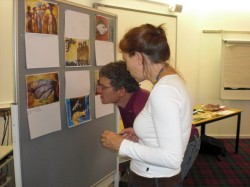Designing a learning event
 There are many ways to use this guide for planning a workshop and the exercises and resources included. It is worth thinking carefully about the scope, purpose and design of your learning event (or series of events) and what can realistically be achieved with the time and resources available. Your activities may take one or more of the following forms:
There are many ways to use this guide for planning a workshop and the exercises and resources included. It is worth thinking carefully about the scope, purpose and design of your learning event (or series of events) and what can realistically be achieved with the time and resources available. Your activities may take one or more of the following forms:
- an exercise, e.g. one activity within a workshop, training or class, or informally as part of a group process or organisational learning; think about the purpose of the exercise in relation to the other elements of the learning process
- a workshop or training, e.g. for staff of organisations, or members of a network or coalition; think about timing and the balance of depth and breadth; is this a brief exposure to new ideas, or an in-depth learning process?
- a course or class session, e.g. for university or adult education students, linked to an educational institution or programme; think about how these methods and exercises can be used within the curriculum, or as part of a new course
- an action research or action learning process; these may last from a few weeks to months or a year or longer, and combine short workshops or group sessions with periods of individual and group work-based practice and reflection. An example of this is given in the Sample Learning Event 3
These guidelines and resources have been used in all of the above ways. For simplicity, we use the term learning event to describe these activities; the term facilitator to refer to trainers, teachers, instructors, facilitators and group leaders; and the term learner to refer to participants, students, action researchers and others taking part in learning events.

